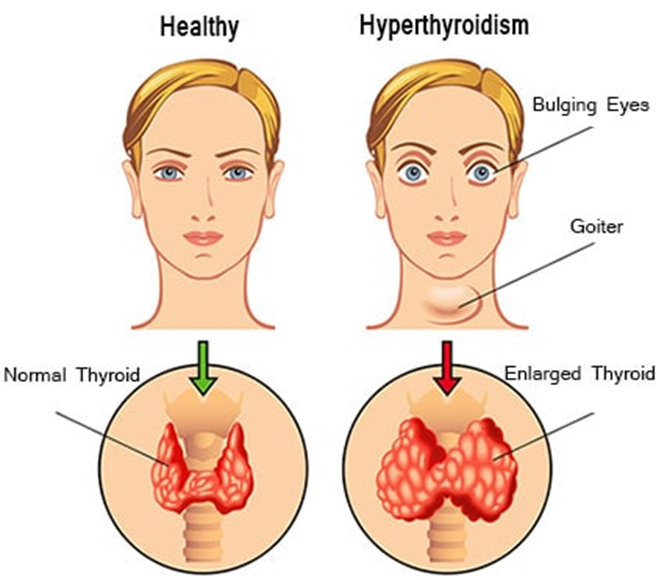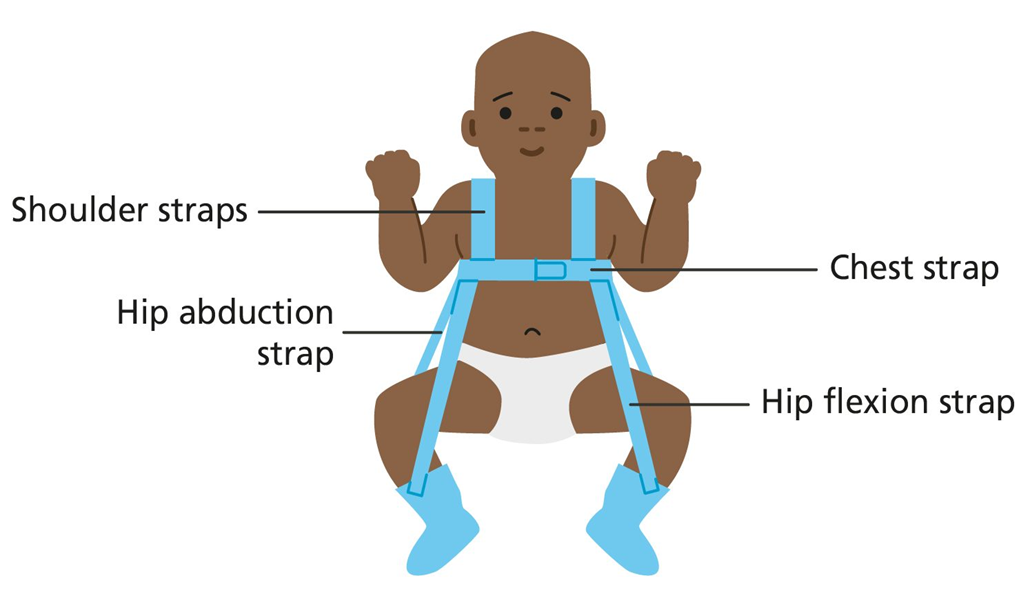The nurse is caring for a school-age child with hyperthyroidism (Graves’ disease). Which clinical manifestations should the nurse monitor that may indicate a thyroid storm? (Select all that apply)
Vomiting
Constipation
Tachycardia
Hypotension
Correct Answer : A,C
The correct answer is a. Vomiting, c. Tachycardia.
Choice A: Vomiting
Vomiting is a common symptom of thyroid storm. Thyroid storm is a life-threatening condition that occurs when the thyroid gland releases a large amount of thyroid hormone in a short period. This sudden surge in thyroid hormone can cause severe metabolic disturbances, leading to symptoms such as vomiting. Vomiting can result from the body’s attempt to cope with the excessive thyroid hormone levels, which can affect the gastrointestinal system.

Choice B: Constipation
Constipation is not typically associated with thyroid storm. In fact, hyperthyroidism, including thyroid storm, usually causes an increase in bowel movements or diarrhea due to the accelerated metabolism. Constipation is more commonly associated with hypothyroidism, where the thyroid gland is underactive and slows down bodily functions.
Choice C: Tachycardia
Tachycardia, or a rapid heart rate, is a hallmark symptom of thyroid storm. The excessive thyroid hormones increase the body’s metabolic rate, leading to an increased demand for oxygen and nutrients. To meet this demand, the heart rate increases significantly, often exceeding 140 beats per minute. This rapid heart rate can be dangerous and requires immediate medical attention.
Choice D: Hypotension
Hypotension, or low blood pressure, is not a typical symptom of thyroid storm. Instead, thyroid storm often causes hypertension (high blood pressure) due to the increased metabolic activity and the body’s heightened demand for oxygen and nutrients. The cardiovascular system responds by increasing blood pressure to ensure adequate blood flow to vital organs.
Nursing Test Bank
Naxlex Comprehensive Predictor Exams
Related Questions
Correct Answer is D
Explanation
Choice A reason:
Bacteriuria, or the presence of bacteria in the urine, is not a primary clinical manifestation of acute renal failure. While facial edema can occur due to fluid retention, bacteriuria is more commonly associated with urinary tract infections. Acute renal failure primarily affects the kidneys’ ability to filter waste and regulate fluid and electrolytes, leading to symptoms such as oliguria and hypertension.
Choice B reason:
Hematuria, or blood in the urine, can be a symptom of various kidney conditions, but it is not a primary manifestation of acute renal failure1. Pallor, or paleness, can occur due to anemia, which may be a secondary complication of chronic kidney disease rather than acute renal failure. The primary symptoms of acute renal failure are related to the sudden decline in kidney function, such as oliguria and hypertension.
Choice C reason:
Proteinuria, or the presence of excess protein in the urine, is more commonly associated with chronic kidney disease or nephrotic syndrome rather than acute renal failure. Muscle cramps can occur due to electrolyte imbalances, but they are not primary manifestations of acute renal failure. The primary symptoms of acute renal failure include oliguria and hypertension.
Choice D reason:
Oliguria, or reduced urine output, and hypertension, or high blood pressure, are primary clinical manifestations of acute renal failure. Acute renal failure results in a sudden decline in kidney function, leading to the retention of waste products and fluids, which can cause oliguria and hypertension. These symptoms are key indicators of acute renal failure and require prompt medical attention.
Correct Answer is B
Explanation
Choice A reason:
Removing the harness several times a day is not recommended. The Pavlik harness should be worn continuously as prescribed by the doctor to ensure proper hip development. Removing it frequently can disrupt the treatment and may lead to complications.
Choice B Reason:
Placing a superabsorbent disposable diaper over the harness is important to keep the harness clean and dry. This helps prevent skin irritation and maintains hygiene. It is essential to ensure that the diaper is properly positioned to avoid any interference with the harness.

Choice C Reason:
Returning to the clinic every 12 weeks for adjustment of the harness is not accurate. Typically, follow-up visits are more frequent, especially in the initial stages of treatment. Regular adjustments are necessary to ensure the harness is fitting correctly and effectively promoting hip development.
Choice D Reason:
Applying lotion or powder to minimize skin irritation is not recommended. Lotions and powders can accumulate and cause further irritation or infection. Instead, keeping the skin clean and dry is the best way to prevent irritation while using the Pavlik harness.
Whether you are a student looking to ace your exams or a practicing nurse seeking to enhance your expertise , our nursing education contents will empower you with the confidence and competence to make a difference in the lives of patients and become a respected leader in the healthcare field.
Visit Naxlex, invest in your future and unlock endless possibilities with our unparalleled nursing education contents today
Report Wrong Answer on the Current Question
Do you disagree with the answer? If yes, what is your expected answer? Explain.
Kindly be descriptive with the issue you are facing.
